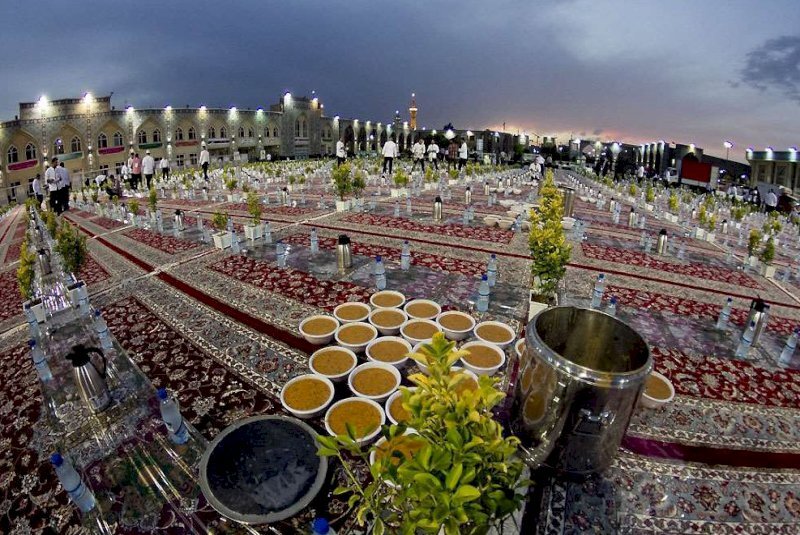Iftar at Imam Reza shrine: a 332-year tradition

TEHRAN – Historical documents indicate that the oldest known Iftar meal was served at the holy shrine of Imam Reza (AS) 332 years ago, which is 1111 AH.
During Islam’s holy month of Ramadan, believers abstain from food and drink during daylight hours, and break their fast with the Iftar evening meals which vary from simple plates of bread, dates, cheese, and tea to heavy ones.
There is evidence indicating various ceremonies held at the holy shrine of Imam Reza (AS) during the Safavid, Afsharid, and Qajar eras in honor of different religious occasions, such as Ramadan, a local official has said.
Among the topics addressed in the historical documents are the special programs of the Qadr nights, the 19th, 21st, and 23rd of the holy month of Ramadan, how to hold Iftar ceremonies for pilgrims and guests, and how to celebrate Eid al-Fitr, the end of Ramadan in the holy shrine, IRIB quoted Zahra Fatemi Moqadam as saying on Friday.
People began praying at the holy shrine during Ramadan month according to these documents, and as the holy shrine was once the center of the city, the prayers could be heard throughout the city during the night, she added.
During the day, people came together at the shrine to read verses of the Holy Quran, she noted.
Then, at sunset, a variety of foods were prepared according to the seasons of the year and all the expenses of preparing these foods were paid for by the holy shrine, she mentioned.
Every day this year, 7,000 pilgrims receive hot food and simple Iftar packages outside the holy shrine in addition to the Iftar meals inside the shrine, she explained.
In the suburbs and deprived areas of Mashhad, 2500 Iftar packages are also distributed each day, she said.
Normally, Mashhad’s holy shrine of Imam Reza (AS) where the eighth Shia Imam is laid to rest, is visited by an average number of 500,000 pilgrims each day, according to Astan Quds Razavi which manages the shrine complex and other associated institutions.
That spiritual tradition of pilgrimage along with sustained efforts to safeguard hospitality services for Razavi pilgrims may join UNESCO’s listing of cultural treasures as Iran has asked the United Nations cultural agency to recognize the concept of ‘Good safeguarding practices to improve hospitality services for Razavi Pilgrims’.
Moreover, the architectural design of the complex has also complied with these traditions and rituals to address the needs of people and the urban landscape.
For Muslims, the ninth month of the lunar Islamic calendar, Ramadan, also known as “Ramazan-e Karim” (benevolent/merciful Ramadan), is a time for, more than ever, practicing humility, patience, simplicity, empathy, and acceptance when things don’t go their way. It’s also a time to make stronger bonds of fellowship.
Muslims observe religious fast from dawn (fajr) to sunset (maghrib) and pray more than usual and with even more intensity to get closer to God. Ramadan is traditionally a time of great hospitality and generosity, so go ahead and accept Ramadan sweets or invitations to feasts, parties, and family gatherings. For Muslims, everything is done ceremoniously and consciously in line with what has been passed down from generation to generation.
Eating, drinking, and smoking in the public are strictly prohibited as they are considered acts of temptation; especially for locals, where failing to observe Ramadan may attract penalties. However, there are exceptions for the ill, pregnant, or physically weak people and even long-distance travelers!
In reverse, during Ramadan, one can eat their heart out from sunset to sunrise. Pretty much every restaurant, food stand, and even household has food ready after dark.
After a long day’s observance of fasting from dawn, Muslim families gather at sunset to break their fast over a meal known as Iftar, which is typically more than just food at the end of a ritualistic day.
During the daytime all restaurants and coffee shops are closed, however, by the sunset, street Iftar meals are ready to grab for those who cannot reach home in time for breaking their fast.
To bring more comfort to the faithful, work schedules in Iran are modified during this month to make the experience of this month as convenient as possible.
Ramadan is estimated to end on May 1. Because of the nature of the lunar calendar system, the dates of Ramadan vary each year and there is always a sort of disagreement among scholars as to when Ramadan precisely start or come to an end.
By tradition, the new moon crescent which is sighted by the naked eye marks the beginning of a new lunar month but these days Muslims prefer to lean towards astronomical calculations to avoid such confusion.
ABU/AFM
Leave a Comment